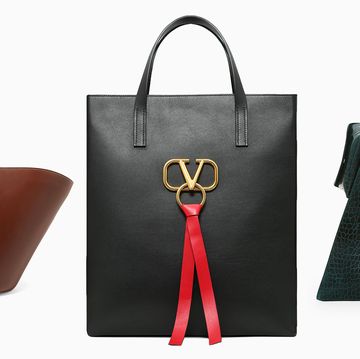At my previous job I had a nemesis. Let's call her Angela. Angela had everything I wanted: better bylines, convivial friendships with senior editors, and a corner desk littered with thank you notes from the many celebrities she had interviewed and charmed. (Did I mention she was a couple years younger than me?) I, in turn, was the new girl with a hand-me-down, condiment-stained keyboard, a privacy-free shared desk, and eyes so green and hungry that I practically wept tears of joy when I was dispatched to an after-hours event in New Jersey to do red carpet reporting. As I gained experience and proved myself on the job, I was awarded choicer opportunities and more responsibility. So was Angela. I interviewed a Housewife on the phone, she jetted to Los Angeles to spend the day with a Grammy winner; I wrote a 200-word blurb that got whittled down to 75, Angie's think piece on violence on TV was granted extra "room to breathe" in the magazine. I'd take a step in the right direction only to watch her lap me. Even as I progressed, the distance between us continued to grow.
I wish I could say that the underdog prevails here, but Angela still outshines me to this day. While we no longer work at the same magazine, she is currently more senior, makes more money, and, to add insult to injury, is still several years younger than me. (The nerve!) Either she's the luckiest girl in the world, or she's just very good at what she does. For the latter to be true, the following statement must also be true: Angela is better at her job than I am at my job. It took me years to admit that. And honestly, it feels better than trying to topple her domain with my Matilda-like mind powers. Less exhausting, anyway.
For many of us, each day begins with self-aggrandizing promises: I will eat better, exercise with more intensity, be nicer to people, and work harder than yesterday. And, each day, we inevitably fall short of our own outsized expectations. It's an endless cycle of defeat that is further exasperated by a little thing called envy.
Problem is, in our #goalobsessed culture, we've been programmed to interpret envy as a Just Do It motivator when it is anything but. "I've seen a lot of research now that equates envy with inspiration and that misses some of these other more pernicious ways people try to get ahead," says Tanya Menon, an associate professor at Fisher College of Business at Ohio State University, whose research on decision making and team culture has appeared in the Wall Street Journal and the Boston Globe. "Most researchers see envy as a highly destructive social emotion—if not the most destructive."
First, a master class in envy versus jealousy: "Envy is about wanting what someone else has and you lack," Menon says. "Jealousy is about protecting what you have." (Hence Nick Jonas' terrain-guarding lyrics: "I wish you didn't have to post it all/ I wish you'd save a little bit just for me/ Protective or possessive, yeah/ Call it passive or aggressive.") But while jealousy may arouse a physiological response similar to that of feeling threatened—quickened heartbeat, general nervousness, and agitation—envy, she says is not a feeling exactly but rather "a social microscope" that pertains exclusively to an individual.
And it's not without its ramifications. "Narrowing," or the all-too-familiar experience of zeroing in on someone else, is especially heightened in areas to which we lay claim. "If I'm really proud of my athletic abilities," explains Menon, "I'm likely to feel more envious if you're a better athlete than I am." When your interests and talents don't intersect, humans are "more likely to bask in [someone else's] reflected glory and feel happy for their successes rather than envious." It's no wonder that Angela's incessant masthead climbing drives me insane while my friend's rapid ascent in the world of fashion merchandising leaves me feeling #blessed.
And though some researchers have found envy to be more rampant among women, Menon says that our tendency toward interpersonal gauging has more to do with nurture than nature. "Look how boys and girls play," she explains. "Girls will often engage in 'self-handicapping,' or talking themselves down, so as not to attract envy. Boys play in highly competitive settings in which there are clear winners and losers. They're raised to be comfortable talking themselves up via trash talk and bragging." And though we are systemically trained to hold other women in higher esteem than ourselves—food for thought: The bulk of our lauded female comedians are self-deprecating and approachable—there is a simple way to avoid the impulse to slash and burn someone else's success.
"At a personal level it's thinking about your own achievements and strengths," Menon says. "By refocusing on yourself rather than on the comparison, you can avoid the temptation to obsess about the other person." It sounds so baseline obvious that I'm tempted to chuck my iPhone out the window. But, upon further consideration, it smacks of the same drama-free rationale tantamount to most lasting adages. (Plus: Menon's research with Leigh Thompson and Hoon Seok Choifinds that affirming our own abilities, even those that have nothing to do with work, effectively loosens envy's chokehold.)
So here goes: I am a loving wife, friend, and sister. I can fire up a killer crow pose without ever having to practice. I have a better-than-average singing voice. And, in less than four years, I've graduated from elbowing my way into 30-second conversations with reality TV caricatures to writing longform profiles on cultural tastemakers who shape and inform how we interact not only with media but each other. I had to fight the urge to edit that last sentence so that it read less braggy and then, again, so that my trajectory somehow sounded more rapid, more Angela-esque. But to do that would be to do myself a disservice. And, truth be told, I'm done playing second fiddle in my own career. Aren't you?

Justine Harman is a Webby-winning podcaster, a 2022 National Magazine Award finalist, and the former features director at Glamour. Listen to new episodes of KILLED HERE.




